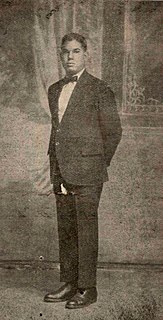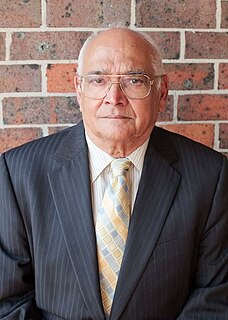Related Research Articles
Siddiq Moidin Koya (1924–1993) was a Fijian Indian politician, Statesman and Opposition leader. He succeeded to the leadership of the mostly Indo-Fijian National Federation Party (NFP) on the death of the party's founder, A. D. Patel, in October 1969, remaining in this post until 1977. He later served a second term as leader of the NFP, from 1984 to 1987.

The National Federation Party is a Fijian political party founded by A.D. Patel in November 1968, as a merger of the Federation Party and the National Democratic Party. Though it claimed to represent all Fiji Islanders, it was supported, in practice, almost exclusively by Indo-Fijians whose ancestors had come to Fiji, mostly as indentured labourers, between 1879 and 1916. However, in the 2018 General elections the party recorded a considerable change in its support base as a consequent of the inclusion of more indigenous Fijian candidates.
Sir Vijay Raghubar Singh, KBE was an Indo-Fijian lawyer and politician who held Cabinet office in the 1960s and 1970s. Vijay Singh served in Prime Minister Ratu Sir Kamisese Mara's government in a variety of positions, including Attorney-General, and was president of the Indian Alliance, a division of the ruling Alliance Party. He quit the party in 1979 following disagreement with Alliance leadership and later joined the opposition National Federation Party. Vijay Singh was involved in the restructure of the Fiji sugar industry and was a leading member of the Jaycees movement in Fiji.

Ambalal Dahyabhai Patel, better known as A.D. Patel, was an Indo-Fijian politician, farmers' leader and founder and leader of the National Federation Party. Patel was uncompromisingly committed to a vision of an independent Fiji, with full racial integration. He was one of the first to advocate a republic, an ideal not realized in his lifetime. He also advocated a common voters' roll and opposed the communal franchise that characterized Fijian politics.

Pt. Vishnu Deo OBE was the first Fiji born and bred leader of the Indo-Fijians. From his initial election to the Legislative Council in 1929 to his retirement in 1959, he remained the most powerful Indo-Fijians political leader in Fiji. He was a staunch supporter of Arya Samaj in Fiji and also the editor of the first successful Hindi-language newspaper to be published in Fiji.
Kunwar Bachint Singh was an Indo-Fijian teacher and politician. He arrived in Fiji in 1927 as a teacher for the Arya Samaj but his association with Vishnu Deo led him to play an active role in aggressively promoting the Arya Samaj and finally into politics. He was elected into the Legislative Council as a protégé of Vishnu Deo but after the election took an independent stance opposed to the wishes of the majority of the Indo-Fijians. He supported nominated rather than elected representation, actively supported the war effort and even attempted to set up a farmers union opposed to a number of existing unions. The Government rewarded him for his loyalty by nominating him into the Legislative Council three times, appointing him as a Justice of the Peace and as the first Indo-Fijian member of the Executive Council.

Chandersen Chattur Singh was an Indo-Fijian politician. He caused a major sensation in the 1937 elections when he defeated A. D. Patel, a well known lawyer and political ally of Vishnu Deo.
Ayodhya Prasad Sharma was an Indo-Fijian farmers' leader and politician. He formed the most successful farmers' union in Fiji and forced the Colonial Sugar Refining Company to make concessions to farmers after 60 years of total control over Fiji's economy. However, other Indo-Fijian leaders formed rival unions and his initial success was not repeated. He also served as a member of the Legislative Council between 1953 and 1959.
Kisan Sangh was the first farmers' union formed in Fiji on 27 November 1937. This was the result of one man's determination to improve the plight of Fiji's Indian cane farmers. Ayodhya Prasad had arrived from India in 1929, and after a stint as a teacher took up cane farming and thus obtained firsthand experience of the problems faced by Fiji Indian cane farmers.
Akhil Fiji Krishak Maha Sangh was a sugar cane farmers' union formed on 15 June 1941 in opposition to the existing union, the Kisan Sangh. Supporters of Kisan Sangh tried to stop the formation of the Maha Sangh but were unsuccessful. The people responsible for the formation of a second sugar cane farmers' union were A. D. Patel and Swami Rudrananda. The union was supported by the South Indian sugar cane farmers in Fiji.

James Madhavan was an Indo-Fijian politician. He was a member of the Legislative Council and House of Representatives for most of the period between 1947 and 1973 and had two spells in the Executive Council.

Muniswamy Mudaliar was an Indo-Fijian politician who was a member of the Legislative Council from 1932 to 1937. In 1933 he became Fiji's first Indo-Fijian Justice of the Peace.
The Federation Party was Fiji's first formal political party. The Citizens Federation, which had won three of the four seats reserved for Indo-Fijians at the 1963 elections, decided to formalize its role as a political party, which was officially founded on 21 June 1964 with A. D. Patel as President and Sidiq Koya as Vice-President. The merger took place in time for the party to participate in the 1965 constitutional conference which was called to map out a path towards independence from the United Kingdom. In 1968, the Federation Party merged with the National Democratic Party to form the National Federation Party, which is now (2021) the oldest political party in Fiji still in existence.
The Citizens Federation was the political expression of a predominantly Indo-Fijian trade union movement, and was a forerunner of the present day National Federation Party.

Karam Chand Ramrakha was a former Fiji Indian lawyer, union leader and politician, who served in colonial Fiji's Legislative Council and independent Fiji's House of Representatives from 1966 to 1982.
The number of Fiji Indians that could be elected to the Legislative Council was fixed over the years as follows:
Mirza Salim Buksh was an Indo-Fijian community leader. One of the first Indo-Fijians to gain a formal education, he was chosen as one of the representatives of the Indian community on a number of occasions. He helped form and supported a number of social and religious organisations. He also served one term as a nominated member in the Legislative Council.
Hindu Maha Sabha was an organisation representing various Hindu organisations and was formed in Fiji in 1926, following the formation of All-India Hindu Maha Sabha in India. The formation of the organisation both in India and Fiji occurred after the assassination of Swami Shraddhanand, a Hindu activist in India. The formation of the Sabha in Fiji coincided with the formation of a national Muslim organisation, the Fiji Muslim League.
This is a synopsis of organisations formed by Indians in Fiji. When they became free from the bondage of indenture and were able to organise themselves, they founded numerous organizations to seek social and political justice. These organisations promoted the teaching of Indian languages and religious practices and also to help others in time of need. Some of the successful organisations are listed below in the order in which they were established. Some, such as the National Federation Party, are no longer exclusively Indian, but are still predominantly so.
On the fiftieth anniversary of the arrival of the first Indians in Fiji, two different organisations called the Fiji Indian National Congress were formed in Fiji. The acting Governor of Fiji, Alfred W. Seymour, despite European opposition, declared 15 May as a public holiday and as a day of rejoicing. Vishnu Deo and his supporters wanted the day to be marked as a day of mourning and on 12 May, at a meeting in Lautoka, it was decided to form the Fiji Indian National Congress. On 14 May, at another meeting in Suva, Dr Hamilton Beattie, who had taken upon himself the responsibility of improving the status of the Indian community, formed another organisation with the same name.
References
- ↑ Gillion, K. L (1977). The Fiji Indians: Challenge to European Dominance 1920-1946. Australian National University Press, Canberra. p. 133. ISBN 0-7081-1291-9.